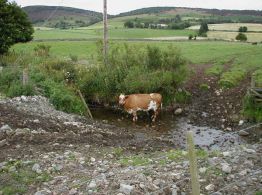Project Aim
"North Sea regional and local implementation of the Water Framework Directive" (NOLIMP-WFD) had two aims: - To show in a practical way how the WFD can be implemented with regard to procedural, management and practical issues with a special focus on matters that produce best practice for local and regional implementation.
- To achieve an improvement in the physico-chemical and ecological water quality in pilot water systems.
Project implementation and results
The EUs Water Framework Directive (WFD) came into force in 2000 and challenges EU Member States to achieve a good chemical and ecological surface water status no later than 2015. NOLIMP sought to address the challenges presented by the Water Framework Directive (WFD). The main outcomes were the increased insight gained into the efforts needed to bring current water systems towards the status required in the Water Framework Directive.
Pilot projects
Experiences were gained in implementing the WFD on a regional level by reducing emissions of pollutants into pilot water schemes. Furthermore, experience with innovative technologies to reduce emissions and to improve biodiversity in pilot water schemes were also achieved. Other benefits included experience with management groups and other stakeholders and insight into the social aspects and cost-effectiveness of integrated water management.
The project has contributed to better water quality through field trials on reconstructing wetland and restoring natural reed banks. The project has succeeded in raising the awareness of the importance of good water quality and the risks of diffused pollution by bringing together municipalities and waterboards, officials, farmers and fishermen.
Joint transnational strategy
Mode of cooperation
Cross-sectorial integration and co-operation between regional and national authorities and research institutes has been a dominant feature of this project. In addition, each partner has actively involved relevant local and regional authorities and other potential stakeholders in the pilot water systems. Experiments with organising the process involving stakeholders and public have been carried out in order to create opportunities and facilities for a lasting water quality improvement even after the project has ended.
Impact of the project
Long-term achievements
The project has succeeded in finding best practices for dealing with the Water Framework
Directive: Public involvement, monitoring of water quality and reducing emissions have been different practices to affect the way of dealing with different aspects of the Water Framework Directive.
For instance, in the county of North Jutland, politicians used the cost effective analysis as an important tool in their planning and decision-making of the action plan for the Mariager Fjord, and the cost effective analysis will thus continue to be an integrated part in future projects. The NOLIMP pilots have served as a forerunner in the implementation process of the Water Framework Directive, as the project has served as an example in many regional and national implementation processes. |

Reconstructing wetland for better water quality, Aberdeenshire (UK)
Partners North Jutland County Council, DK
Norwegian Institute for Water Research (NIVA), NO
Aberdeenshire Council, UK
Landwirtschaftskammer Weser-Ems (We), DE
Länsstyrelsen Västra Götaland, SE
LP:
Province of Fryslan
Project Manager
Folkert Kuipers
Province of Fryslân Tweebaksmarkt 52
P.O.Box 20120 NL-8900 HM Leeuwarden
The Netherlands
f.kuipers@fryslan.nl
www.nolimp.org
Tel: +31 58 292 5290
Measure: 4.2
Start Date: 30 September 2002
End Date: 31 December 2006
ERDF Grant:
 4.225.000,00 4.225.000,00
Total Eligible Sum:
 8.450.000,00 8.450.000,00
|